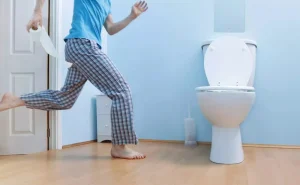Waking up in the middle of the night to use the bathroom is something many people experience at some point in their lives. For some, it’s a rare occurrence, while for others it becomes a nightly habit. But when does this behavior move from being a normal part of life to a sign of an underlying health issue? Understanding the difference between occasional nighttime urination and abnormal patterns, known as nocturia, can help you decide whether it’s time to make lifestyle adjustments or consult a doctor.
What’s Considered Normal?
For most healthy adults, it’s possible to sleep through the night without needing to urinate. However, waking up once per night is generally considered normal, especially if you’ve had a glass of water, tea, or another beverage before bed.
It’s also important to note that as we age, our bodies undergo natural changes that affect how we store and process fluids. For example:
-
Decreased hormone production: The body produces less of the hormone that helps us retain fluids overnight.
-
Reduced bladder capacity: With age, the bladder may not hold as much liquid as it once did.
This explains why people over the age of 60 are more likely to wake up to urinate, even if they are otherwise healthy.
When Does It Become Abnormal?

Nighttime urination becomes a concern when it happens two or more times per night on a regular basis. Beyond the inconvenience, frequent waking can negatively affect your quality of sleep, leading to:
-
Daytime fatigue and lack of focus
-
Irritability or mood swings
-
Increased risk of other health issues tied to poor sleep
Some warning signs that your nighttime urination may be abnormal include:
-
Waking up often without an obvious reason (such as drinking excess fluids).
-
Experiencing a sudden, strong, or painful urge to urinate at night.
-
Producing large volumes of urine during the night (nocturnal polyuria).
-
Needing to urinate frequently both day and night.
-
Feeling chronically tired or sleep-deprived due to multiple awakenings.
Common Causes of Abnormal Nocturia
Abnormal nighttime urination can stem from several different conditions, ranging from mild to serious. Some of the most common causes include:
-
Overactive Bladder (OAB) – A condition where bladder muscles contract too often, creating frequent urges.
-
Urinary Tract Infections (UTIs) – Can trigger burning sensations and an increased need to urinate.
-
Diabetes – Elevated blood sugar levels may cause the body to produce more urine, even at night.
-
Congestive Heart Failure – Fluid buildup in the legs during the day can shift back into circulation at night, leading to frequent urination.
-
Sleep Disorders – Conditions like insomnia or sleep apnea can increase nighttime awareness of bladder activity.
-
Medications – Especially diuretics or drugs taken close to bedtime.
Tips to Manage Nighttime Urination Naturally
If you’re experiencing frequent nighttime urination but don’t have an underlying medical diagnosis yet, lifestyle adjustments can often help reduce the problem:
-
Limit evening fluids: Avoid drinking large amounts 2–4 hours before bedtime.
-
Avoid stimulants: Caffeine and alcohol can irritate the bladder and increase urination.
-
Elevate your legs: If you have swelling in your legs, raising them during the day can help prevent nighttime fluid buildup.
-
Use compression socks: These can reduce fluid retention in the lower body.
-
Empty your bladder fully: Make sure to use the restroom before going to bed.
When to Seek Medical Advice
If frequent nighttime urination is disrupting your sleep or causing discomfort, it’s important to speak with a healthcare professional. A doctor may recommend:
-
Keeping a bladder diary: Tracking fluid intake, urine output, and wake-up times.
-
Medical tests: To check for diabetes, urinary infections, or bladder function issues.
-
Personalized treatment plans: Depending on the cause, treatment may involve medication, lifestyle changes, or both.




